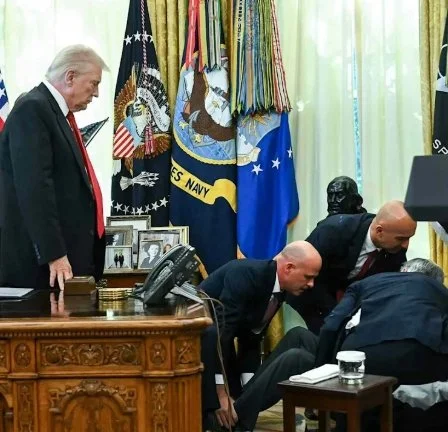The Rise of the Billionaire Celebrity: From Listeners to Dictators
In the early 2000s, the cultural landscape was marked by the admiration of millionaire entrepreneurs who, despite their success, were often depicted as accessible figures eager to mentor and invest in others. Shows like Shark Tank, Dragons' Den, and Undercover Boss presented wealth not as an impenetrable barrier but as an aspirational milestone within reach. Millionaires listened, advised, and partnered with aspiring entrepreneurs. Their success stories served as a roadmap for anyone with a good idea and a strong work ethic.
Fast forward to 2025, and the scenery has shifted dramatically. Today, we live in the era of the billionaire celebrity, where figures like Elon Musk, Jeff Bezos, and Mark Zuckerberg are no longer merely successful businesspeople; they are sovereign actors with the ability to influence politics, culture, and even the fate of nations. The tone has shifted from mentorship to command. The billionaire no longer listens; he demands.
This evolution is not incidental. It reflects deeper transformations in wealth concentration, media ecosystems, and public trust in institutions. It represents a profound cultural shift from a world where the wealthy participated in society to one where they increasingly govern it.
From Millionaire Mentorship to Billionaire Dominion
During the 2000s, the "millionaire listener" archetype was dominant. Undercover Boss sent CEOs into the trenches to understand their employees' struggles. Shark Tank portrayed millionaires as discerning but approachable, eager to lift the next entrepreneur to success. Wealth, while impressive, was still presented as fundamentally accessible. Millionaires engaged with the public by offering advice, opportunities, and investments. They positioned themselves as stewards of success, not as overlords.
But as wealth gaps widened and the internet decentralized public discourse, a new kind of figure emerged: the billionaire as brand and empire. Instead of participating in the existing systems, billionaires began to challenge and reshape them entirely.
Billionaires like Musk have turned social media platforms into personal megaphones. They no longer just influence markets; they influence wars, elections, and public policy. The assumption has shifted: success is no longer an invitation to mentor others; it is a mandate to mould society in their image.
Musk and the Politics of Power
Elon Musk offers a particularly stark example of this evolution. Recent events highlight the sheer scope of his ambitions. Musk's America PAC initiated a controversial campaign offering $1 million to registered voters in swing states who signed a petition supporting constitutional rights. Though framed as a "promotional" effort, critics aptly noted the resemblance to outright vote-buying. Legal challenges ensued, but the courts, reflecting perhaps the new ambiguity about wealth and democracy, allowed the campaign to continue.
At the same time, Musk accepted a formal role in governance, heading the newly created Department of Government Efficiency (DOGE) under President Trump. In this position, Musk sought to "streamline" federal operations, but the Senate quickly raised alarms about conflicts of interest, noting that Musk's interventions were likely to shield his private enterprises from billions in liabilities.
The lines between private wealth and public governance blurred almost beyond recognition. The protests that followed — the "Tesla Takedown" movement — signaled public discomfort, but not enough to reverse the trend. Musk's influence remained largely intact, illustrating a new norm: billionaires, unencumbered by traditional political checks, now play direct roles in shaping public policy.
The Changing Public Relationship with Wealth
In the early 2000s, millionaires were seen as "one of us" — exceptional perhaps, but still tethered to common values. Today’s billionaire celebrities are viewed as "above us," commanding not only immense wealth but also the mechanisms that govern society.
This shift has profound implications:
Concentration of Power: Billionaires now control not just industries but communication platforms, political discourse, and international diplomacy. Once the domain of state actors, war logistics can now hinge on the decision of a single private individual.
Collapse of Institutional Trust: As traditional institutions (governments, media, universities) lose public trust, billionaires fill the vacuum. They offer the allure of efficiency and innovation but without the accountability that democratic governance demands.
Spectacle over Substance: The billionaire's personal brand becomes the focal point. Public attention is captured not by thoughtful policy discussions but by spectacle — Musk’s provocative tweets, Zuckerberg's metaverse ambitions, Bezos’ space escapades.
This shift also reflects the erosion of boundaries between entertainment, commerce, and governance. Wealth itself has become a form of celebrity. Success is measured not by the number of people helped or products improved, but by the scope of disruption and the size of the following.
The Billionaire as Sovereign
Perhaps the most troubling aspect of this evolution is the way it recasts the very notion of sovereignty. Billionaires now resemble medieval lords, operating with autonomy within (and often above) nation-states. They are not merely business leaders; they are political actors with their own courts, armies (private security and paramilitary tech), treasuries, and laws.
The unsettling reality is that decisions of critical societal importance — decisions that affect communications, infrastructure, and public safety — are increasingly made not by elected officials, but by billionaire CEOs. In this new world, loyalty is to the brand, not the constitution; allegiance is purchased, not earned.
Simply Put: A Call for Reflection
The transition from millionaire mentors to billionaire dictators represents more than a cultural curiosity; it is a fundamental transformation of the relationship between wealth, power, and democracy.
Once, wealth was seen as a reward for value created and a resource to be reinvested into society. Today, it is a license to command, a platform for personal empire-building. The billionaire no longer listens or advises; they demand and dictate.
This phenomenon demands urgent public scrutiny. If billionaires are to wield power traditionally reserved for governments, they must also be subject to corresponding checks and balances. Transparency, accountability, and public oversight must extend beyond the halls of government into the boardrooms and private islands of the ultra-wealthy.
Otherwise, we risk drifting into a neo-feudal order where citizenship is replaced by fandom, governance by influence, and democracy by the whims of an unelected elite, though some would argue we are already there.






